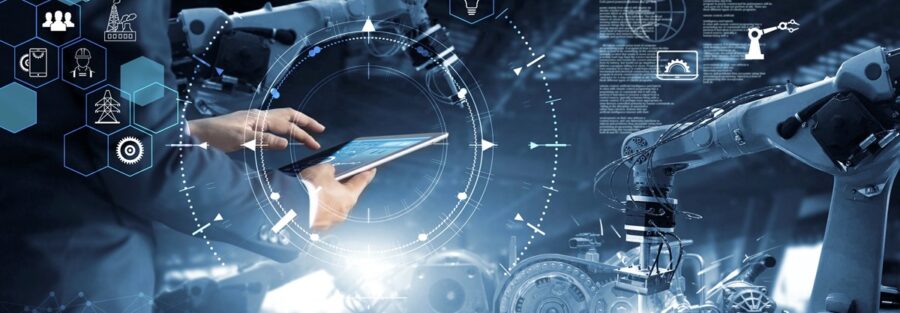The Role of AI and Machine Learning in Optimizing Manufacturing Processes
Artificial intelligence (AI) and machine learning have revolutionized various industries, and manufacturing is no exception. These technologies have the potential to transform the manufacturing industry by optimizing processes and improving efficiency. In this section, we will explore the role of AI and machine learning in optimizing manufacturing processes.
One of the key areas where AI and machine learning can make a significant impact is in predictive maintenance. Traditionally, manufacturers have relied on scheduled maintenance to prevent equipment failures. However, this approach is not always effective, as it can result in unnecessary downtime and maintenance costs. AI and machine learning algorithms can analyze vast amounts of data from sensors and other sources to predict when equipment is likely to fail. By identifying potential issues before they occur, manufacturers can schedule maintenance at the most opportune times, minimizing downtime and reducing costs.
Another area where AI and machine learning can optimize manufacturing processes is in quality control. Ensuring product quality is crucial for manufacturers, as defects can lead to customer dissatisfaction and increased costs. AI and machine learning algorithms can analyze data from various sources, such as sensors and cameras, to detect defects in real-time. By identifying and addressing quality issues early on, manufacturers can reduce waste, improve customer satisfaction, and increase profitability.
Inventory management is another aspect of manufacturing that can benefit from AI and machine learning. Maintaining optimal inventory levels is essential to avoid stockouts and excess inventory. AI and machine learning algorithms can analyze historical data, customer demand patterns, and other factors to predict future demand accurately. By having a better understanding of demand, manufacturers can optimize inventory levels, reduce carrying costs, and improve overall supply chain efficiency.
AI and machine learning can also play a crucial role in optimizing production scheduling. Manufacturing processes are often complex, involving multiple machines, resources, and constraints. AI and machine learning algorithms can analyze various factors, such as machine availability, production capacity, and order priorities, to generate optimal production schedules. By optimizing production schedules, manufacturers can minimize idle time, reduce lead times, and improve overall productivity.
Furthermore, AI and machine learning can enhance product design and development processes. These technologies can analyze vast amounts of data, including customer feedback, market trends, and competitor analysis, to identify opportunities for product improvement and innovation. By leveraging AI and machine learning, manufacturers can develop products that better meet customer needs, differentiate themselves from competitors, and drive business growth.
In conclusion, AI and machine learning have the potential to transform the manufacturing industry by optimizing processes and improving efficiency. From predictive maintenance to quality control, inventory management to production scheduling, and product design to development, these technologies can revolutionize various aspects of manufacturing. By harnessing the power of AI and machine learning, manufacturers can reduce costs, improve productivity, enhance product quality, and gain a competitive edge in the market. As the manufacturing industry continues to evolve, embracing AI and machine learning will be crucial for staying ahead of the curve and driving success in the future.
Enhancing Quality Control and Predictive Maintenance with AI and Machine Learning in Manufacturing
In recent years, the manufacturing industry has witnessed a significant transformation with the integration of artificial intelligence (AI) and machine learning. These technologies have revolutionized various aspects of manufacturing, including quality control and predictive maintenance. By harnessing the power of AI and machine learning, manufacturers can now improve their processes, reduce costs, and enhance overall efficiency.
One of the key areas where AI and machine learning have made a substantial impact is quality control. Traditionally, quality control in manufacturing involved manual inspection of products, which was time-consuming and prone to human error. However, with the advent of AI and machine learning, manufacturers can now automate the quality control process, ensuring consistent and accurate results.
AI-powered systems can analyze vast amounts of data in real-time, enabling manufacturers to detect defects and anomalies more efficiently. By training machine learning algorithms on historical data, these systems can learn to identify patterns and deviations from the norm. This allows manufacturers to identify potential quality issues early on, preventing defective products from reaching the market.
Furthermore, AI and machine learning can also help manufacturers optimize their predictive maintenance strategies. Predictive maintenance involves using data and analytics to predict when equipment is likely to fail, allowing manufacturers to schedule maintenance proactively. This approach helps minimize downtime, reduce maintenance costs, and extend the lifespan of equipment.
By leveraging AI and machine learning, manufacturers can analyze sensor data from machines and equipment to identify patterns that indicate potential failures. These patterns can be used to develop predictive models that can accurately forecast when maintenance is required. This proactive approach to maintenance ensures that repairs are conducted before a breakdown occurs, preventing costly production disruptions.
Moreover, AI and machine learning can also optimize maintenance schedules based on factors such as production demand, resource availability, and equipment usage patterns. By considering these variables, manufacturers can prioritize maintenance activities and allocate resources more effectively. This not only improves operational efficiency but also reduces unnecessary maintenance, resulting in cost savings.
Another significant advantage of AI and machine learning in manufacturing is the ability to continuously learn and improve. As these technologies analyze more data and gain more insights, their predictive capabilities become more accurate and reliable. This iterative learning process allows manufacturers to refine their quality control and predictive maintenance strategies over time, leading to continuous improvement in product quality and operational efficiency.
However, it is important to note that the successful implementation of AI and machine learning in manufacturing requires a robust data infrastructure. Manufacturers need to collect and store vast amounts of data from various sources, including sensors, machines, and production lines. This data needs to be properly labeled, organized, and accessible for training machine learning algorithms.
Additionally, manufacturers must also invest in the necessary computational resources and expertise to develop and deploy AI-powered systems. This may involve partnering with technology providers or hiring data scientists and AI specialists. By investing in the right infrastructure and expertise, manufacturers can fully harness the potential of AI and machine learning to transform their operations.
In conclusion, AI and machine learning have revolutionized quality control and predictive maintenance in the manufacturing industry. These technologies enable manufacturers to automate the quality control process, detect defects more efficiently, and prevent defective products from reaching the market. Additionally, AI and machine learning optimize predictive maintenance strategies, minimizing downtime, reducing costs, and extending equipment lifespan. By continuously learning and improving, manufacturers can achieve higher levels of product quality and operational efficiency. However, successful implementation requires a robust data infrastructure and the necessary computational resources and expertise. With the right investments, AI and machine learning have the potential to transform the manufacturing industry and drive it towards a more efficient and productive future.



